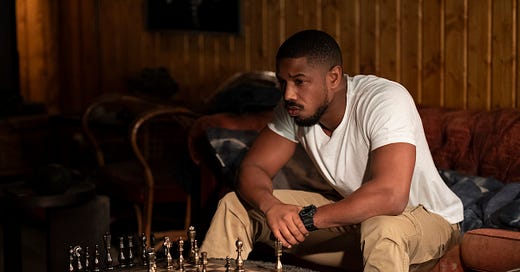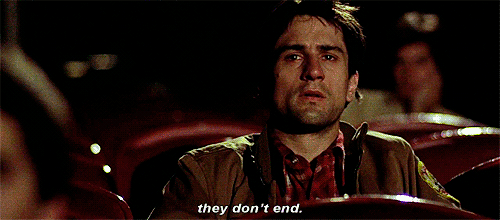
'Tom Clancy's Without Remorse,' Reviewed
Plus: What can we learn about box office resiliency from Asia?
Okay, folks: We’re trying something out. The comments on this newsletter/post are going to be open for paying Bulwark+ members. (Sign up here if you want in on the fun!) So, you can chime in on anything below, or with Oscars thoughts, or questions about past letters. All I ask is that you stay, broadly speaking, on topic. If this works—and I have no reason to believe it won’t, you’re all smart, polite, discerning folks—we’ll expand it to the other parts of my mini empire, Across the Movie Aisle and The Bulwark Goes to Hollywood. And if it doesn’t, either through lack of interest or the general rudeness that comments sections sometimes (sometimes!) encourage, then that’s cool too. We’ll just shut it down forever.
A Behavioral Question
The big question that faces the film industry going forward is this: Will audience behavior rebound to something like normal after the pandemic, or is this closure and shift to home viewing permanent?
As COVID raged, plenty of people smarter than your humble narrator suggested it was, if not quite the end of movie theaters and not quite the beginning of the end (that having begun years before with the rise of VHS then cable then VOD then piracy), then the end of the beginning of the end of movie theaters. The beginning of the middle of the end, if you will. For instance, here’s Richard Brody, writing in March of last year, comparing the looming production and exhibition shutdown to the one that took place during the Spanish Flu epidemic in 1918: “The hunger for entertainment will drive viewers to new releases online whenever they show up, and that studios will begin calculating their online streaming drop dates with the same care that they devote to their theatrical-release calendar.”
There has, undoubtedly, been a shift to home viewing. How could there not be? But what remains unclear, thanks to the paucity of good data, is just how valuable this shift has been, really, for the studios and the distributors. Suffice to say, the lack of true tentpoles dropping on VOD—as opposed to being shifted, or sold, to streaming services, where individual customer transactions matter less, thus profits and losses are more easily obscured—suggests that it is absolutely infeasible for this model to work on the truly hugely budgeted films that comprise Hollywood’s profit centers.
This means there are still studio folks counting on a Roaring Twenties Redux of sorts. As the Hollywood Reporter noted in April of last year, once the global flu pandemic subsided “the studios were running to capacity, and the temporary losses suffered because of the flu were tempered by the mad entertainment crush and money rush of the 1920s.” This time around, the losses are much deeper, the closures much more protracted. The big question is, will the boom be as big as the damage was deep?
One clue out of Asia suggests that things might return to pre-COVID levels. In its earnings call this week, IMAX reported that earnings in Asia were more or less back to normal.
“In China, a box office rebound and a pickup in theater installations drove a revenue recovery to a pre-pandemic level of $26 million, in line with first quarter 2019,” the Hollywood Reporter reported. Yes, IMAX still took a huge hit, as most theaters outside of Asia remain closed or bereft of new product. But where theaters are open and where there is new product to watch, audiences are returning. The auditoriums are filled again. Nature is healing.
The bet is that audiences will always return. And it’s becoming clearer that there is a certain segment of the audience that will return. Between Godzilla vs. Kong closing in on $90 million domestic and the R-rated Mortal Kombat clearing over $23 million despite being available on HBO Max—to say nothing of the surprisingly robust $21 million opening for the anime Demon Slayer, marking the first time two films have cleared $20 million on the same weekend since before the pandemic—it’s obvious that there’s an audience hungry to return. A younger, more male audience, for sure. But an audience nevertheless.
But is it just that one quadrant whose behavior will return to normal? Will confused messaging from the CDC keep audiences from returning enthusiastically? Will Black Widow’s availability on Disney+ for $30 tamp down enthusiasm for seeing it in theaters? Can Fast 9 reignite the love so many have for the big screen?
One can hope.
If you want to give a friend hope about the movie theaters (my local Alamo Drafthouse is opening sometime in June, maybe! Hooray!) or to dissuade them from seeing Without Remorse, share this newsletter with them! You’ll be their hero, I guarantee it.
Review: Without Remorse (Prime Video)
The most dangerous thing for a film lover to have is hope.
“There’s a reason why this prison is the worst hell on earth: hope,” a wise man once said to his nemesis as he left him to die in a pit halfway around the world from his home. “I learned here that there can be no true despair without hope.”
The entire film industry is built on hope; this is why the trailer-industrial complex has spent so much time and money perfecting the art of two-minute movie ads. The idea is to give the average person hope that what they’re seeing will be good, maybe great. Few movies are truly terrible; most are mediocre. The hope that any good trailer fills you with is the hope that the thing you’re watching will transcend mediocrity and do something new—or, at least, something exciting.
So when you see a trailer for something like Without Remorse and you note that it stars Michael B. Jordan (who reinvigorated the Rocky franchise and played one of the MCU’s best villains, Killmonger) and you read that it was written by Taylor Sheridan (Sicario, Wind River, Hell or High Water) and you see it’s based on a novel by Tom Clancy (whose Jack Ryan is the undisputed champ of espionage-based action-thrillers) and the trailer suggests what you’re about to see is a John Wick-style escapade of revenge-murdering, you allow yourself to hope. Like so many crippled billionaires looking up at a pinprick of sky from the desert hole into which they’ve been tossed, you imagine for one brief moment a better life.
But Without Remorse inspires despair precisely because it sparked that brief glimmer of hope.
Without Remorse stars Jordan as John Kelly, helpfully described to us as “the badass” before his SEAL team raids a Russian arms depot in Aleppo to rescue a CIA operative. Except he and his team didn’t know it was a Russian arms depot. And they’re going to pay for that lack of knowledge with their lives—or the lives of their loved ones.
After John’s pregnant wife is killed, and he is almost killed, by a team of Russians, he sets out to discover just why shady CIA operative Robert Ritter (Jamie Bell) put them in that Russian safe house in the first place, and, with the aid of the surprisingly helpful Secretary of Defense Thomas Clay (Guy Pearce), track down just who okayed the hit on John’s family, and, well, if you can’t see exactly where all this is going, congratulations on seeing your first spy thriller, hope you enjoyed it.
It’s not just that Without Remorse is predictable, though the film is that. It’s not just that the script from Sheridan and Will Staples is a reheated mishmash of well-worn agitprop about the military-industrial complex’s various iniquities, though it is that. And it’s not just that Michael B. Jordan can’t quite sell the racked-with-grief John or that I don’t quite buy former model Jodie Turner-Smith as the leader of his SEAL team, though he cannot and I do not.
The biggest issue I have with Without Remorse is how remarkably dull it is, visually speaking. Director Stefano Sollima doesn’t seem to have a single interesting idea about how to shoot or stage the action in this picture, and with the exception of a decent plane crash sequence in the middle of the film, there’s absolutely no tension to any of the set pieces. It’s flat, boring, just a series of cuts showing a bunch of people shooting at each other before escaping in increasingly ridiculous ways into absurdly convenient vehicles that are idling nearby. It’s the sort of movie that inspires you to reach for your phone to see how your fantasy baseball team is doing while you kill a couple hours, which may be why it wound up on Prime.
It’s the sort of movie that reminds you why having hope for franchise fare is so often a bad idea.
Assigned Viewing: Requiem for a Dream (Cinemax/4K Blu-ray)
I was so bummed following Without Remorse that I decided I needed a full depression-flush after screening it. And what better to clean out the system than a viewing of the film most nominated for “best picture I’ve ever seen that I never want to see again” than Darren Aronofsky’s ode to addiction, Requiem for a Dream?
Okay, the real reason I watched it was because a.) I’ve had the 4K disc for a few months now but haven’t worked up the nerve for a rewatch and b.) I needed something with a little visual panache after Sollima’s snoozefest of an action flick. And if there’s anything Aronofsky knows how to do, it’s create visual excitement: From the hip hop montages to the split screens showing two POVs simultaneously to the speeding and slowing of action depending on the drugs being consumed to the frenetic editing of the final 20 minutes, which calls to mind a George Lucas or Christopher Nolan-style intercut action sequence tracking three different finales simultaneously, only if all three finales took place in hell, Requiem for a Dream is never dull.
And, as a bonus, it looks really good on the new 4K transfer. Check it out if you want to give your home theater a proper test drive!














"Based on" the Tom Clancy novel? What part did they "base" it on, since the only thing I recognize is the title? Without Remorse was the origin story of John Clark, who features in nearly all the other Clancy novels. It should have been treated with RESPECT. But I suppose it's par for the course for the modern Clancy franchise, where some unknown amateur writes a trashy book and sticks Clancy's name on the cover.
I made it through the first eight minutes of Without Remorse, and all of twenty five minutes of the new season of Handmaid's Tale. I, like the rest of the world, loved the first season but it's just relentlessly bleak and depressing. And Without Remorse filled me with the same feeling. And I like Michael B. Jordan, (although The NY Times including him on its list of the 25 greatest actors would be the single biggest joke ever perpetrated by film critics if the list didn't also include Keanu Reeves). Maybe it's the feeling that after a year of covid lockdowns, we need something other than stale formats and endless darkness. And a break from Prime/Netflix's obsession for superheroes and action franchises wouldn't hurt either.